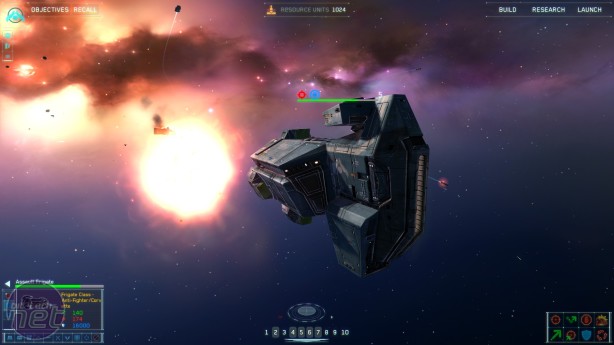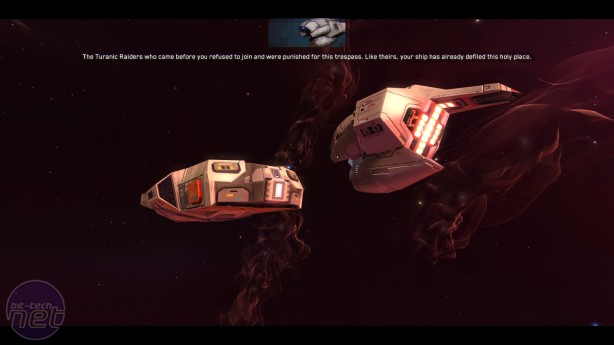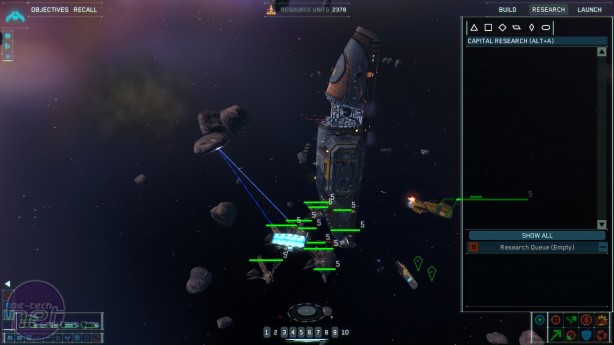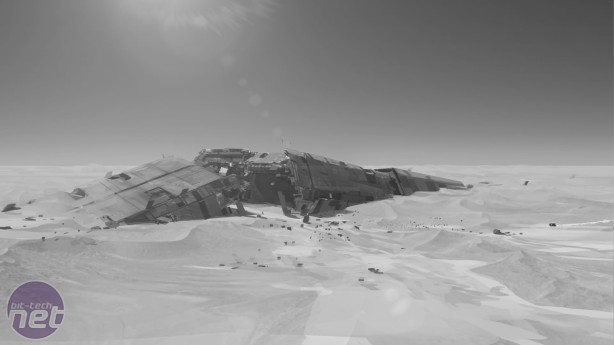
The only area where Homeworld shows its age is in the drop-down menus and the tactical display. The former retains a distinctly 90s chunkiness, while the latter is rendered in an unpleasantly jagged wireframe. This is a minor complaint. Most of the time both are tucked safely away in far corners of the screen, leaving you with a grand, clean view of space.
Above all else, what I admire about Homeworld is its elegance. It is an effortlessly classy game. From the use of Barber's elegiac Adagio for Strings in the game's opening scenes, to the coloured trails that ships leave behind as they twist and twirl and dance during combat. It's the sort of thing that should be experienced while reclining in a high-backed armchair with a full-bodied red and a plate of well-matured cheese. This isn't restricted to the game's audiovisual side either. The story is recounted with a similarly stripped-back melancholy, while the game's rock, paper, scissors unit strategy makes it easy to grasp and suitably graceful when forming and adjusting tactics.
Yet just because Homeworld likes to stroll about the house in a velvet dressing-gown and spend its evenings perusing Shakespeare doesn't mean it can't kick like a taekwondo expert when it needs to. Like all of Relic's RTS games, Homeworld's focus is overwhelmingly on combat, with a particular emphasis on spectacle. A battle in Homeworld is a beautifully destructive thing. The void alights with arcing laser fire and sounds with the distant concussions of exploding missiles. But my favourite strategy in Homeworld is using salvage corvettes and frigates to steal enemy ships. There's nothing more satisfying than landing four corvettes on a lumbering enemy Destroyer and seeing it dragged slowly back to your Mothership. Weaponised irony is the most satisfying kind.
Despite the delightful production values and systemic craft, sometimes I think I would prefer to watch someone else play Homeworld than play it myself. All too often I find it to be an exercise in frustration. This is particularly the case with the campaign, where some of the mission design is just bizarre. A noteworthy example is mission six, where you must blast your way through a dangerous asteroid belt. It's abysmal; slow, monotonous, and incredibly irritating since your ships can't consistently target asteroids as they break into pieces.
More generally, Homeworld's campaign tries a little too hard to keep you under pressure. You have to be extremely efficient at gathering resources in order to survive some of the more time-crucial levels. It's a more pleasant experience played in individual matches, which allow you more time and flexibility to assemble your forces and form a strategy.
None of this is why Homeworld leaves me feeling cold. The reason for that, I discovered, is simply because Homeworld is cold. It's an elegant game, but also an extremely distant and impersonal one. The story deals with the fate of entire races rather than individuals, to the point of treating them almost as individuals. This is intended to feed into Homeworld's sense of grandeur. But I think the game is too emotionally standoffish. The Kushan react to the destruction of their home planet Kharak with almost a workmanlike shrug, while impassive descriptions of torture such as "The subject did not survive interrogation," don't engender much sympathy for them. I find it difficult to identify with a society that bears little-to-no consideration for the fate of individuals. Incidentally, this is something which Relic improved on considerably in games like Company of Heroes and Dawn of War II.
Try as I might, Homeworld simply isn't for me. But I certainly don't think it or its sequel are bad games. I can see why they appeal so much to so many, and the Remastered Collection undoubtedly does an excellent job of reworking these games for modern machines and new audiences. I might not feel it in my heart, but I can still see with my eyes that the Remastered Collection is a fine update to two deserving games.
Above all else, what I admire about Homeworld is its elegance. It is an effortlessly classy game. From the use of Barber's elegiac Adagio for Strings in the game's opening scenes, to the coloured trails that ships leave behind as they twist and twirl and dance during combat. It's the sort of thing that should be experienced while reclining in a high-backed armchair with a full-bodied red and a plate of well-matured cheese. This isn't restricted to the game's audiovisual side either. The story is recounted with a similarly stripped-back melancholy, while the game's rock, paper, scissors unit strategy makes it easy to grasp and suitably graceful when forming and adjusting tactics.
Yet just because Homeworld likes to stroll about the house in a velvet dressing-gown and spend its evenings perusing Shakespeare doesn't mean it can't kick like a taekwondo expert when it needs to. Like all of Relic's RTS games, Homeworld's focus is overwhelmingly on combat, with a particular emphasis on spectacle. A battle in Homeworld is a beautifully destructive thing. The void alights with arcing laser fire and sounds with the distant concussions of exploding missiles. But my favourite strategy in Homeworld is using salvage corvettes and frigates to steal enemy ships. There's nothing more satisfying than landing four corvettes on a lumbering enemy Destroyer and seeing it dragged slowly back to your Mothership. Weaponised irony is the most satisfying kind.
Despite the delightful production values and systemic craft, sometimes I think I would prefer to watch someone else play Homeworld than play it myself. All too often I find it to be an exercise in frustration. This is particularly the case with the campaign, where some of the mission design is just bizarre. A noteworthy example is mission six, where you must blast your way through a dangerous asteroid belt. It's abysmal; slow, monotonous, and incredibly irritating since your ships can't consistently target asteroids as they break into pieces.
More generally, Homeworld's campaign tries a little too hard to keep you under pressure. You have to be extremely efficient at gathering resources in order to survive some of the more time-crucial levels. It's a more pleasant experience played in individual matches, which allow you more time and flexibility to assemble your forces and form a strategy.
None of this is why Homeworld leaves me feeling cold. The reason for that, I discovered, is simply because Homeworld is cold. It's an elegant game, but also an extremely distant and impersonal one. The story deals with the fate of entire races rather than individuals, to the point of treating them almost as individuals. This is intended to feed into Homeworld's sense of grandeur. But I think the game is too emotionally standoffish. The Kushan react to the destruction of their home planet Kharak with almost a workmanlike shrug, while impassive descriptions of torture such as "The subject did not survive interrogation," don't engender much sympathy for them. I find it difficult to identify with a society that bears little-to-no consideration for the fate of individuals. Incidentally, this is something which Relic improved on considerably in games like Company of Heroes and Dawn of War II.
Try as I might, Homeworld simply isn't for me. But I certainly don't think it or its sequel are bad games. I can see why they appeal so much to so many, and the Remastered Collection undoubtedly does an excellent job of reworking these games for modern machines and new audiences. I might not feel it in my heart, but I can still see with my eyes that the Remastered Collection is a fine update to two deserving games.
-
Overall80 / 100


MSI MPG Velox 100R Chassis Review
October 14 2021 | 15:04













Want to comment? Please log in.